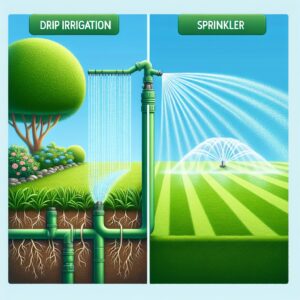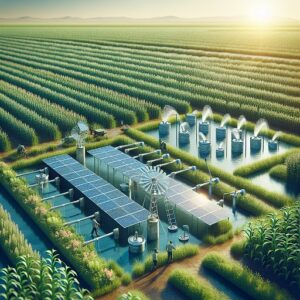
Article-at-a-Glance
-
Sodium-sulfur batteries offer high energy density, making them ideal for large-scale solar irrigation systems.
-
They operate at high temperatures, which contributes to their high efficiency and long life cycle.
-
Integrating sodium-sulfur batteries into solar irrigation can reduce operating costs and carbon footprint.
-
Proper assessment, installation, and maintenance are crucial for the successful use of sodium-sulfur batteries in farming.
-
Real-world examples demonstrate the benefits and practicality of using sodium-sulfur batteries for solar-powered irrigation.

Unlocking the Power of Sodium-Sulfur Batteries for Farming
As we delve into the world of sustainable agriculture, it’s crucial to arm ourselves with the right tools and knowledge to make informed decisions. Solar irrigation systems have become increasingly popular in recent years as a sustainable and eco-friendly solution for agriculture and water management. These systems utilize solar energy to power water pumps and irrigation systems, reducing the reliance on fossil fuels and decreasing carbon emissions. However, one of the key components of a solar irrigation system is the battery, which stores the solar energy for later use. While there are various types of batteries available, one that has gained attention recently is the sodium-sulfur battery.
What Are Sodium-Sulfur Batteries?
Imagine a battery that can store a massive amount of energy and keep your crops watered using the power of the sun. That’s what sodium-sulfur batteries can do. These batteries use molten sodium and sulfur to create a chemical reaction that stores and releases electricity. They’re known for their high energy density, which means they can hold a lot of power in a small space.
Why Sodium-Sulfur Batteries for Farms?
So, why should you, as a farmer, consider these batteries? Because they can store solar energy during the day and power your irrigation systems whenever needed, even at night or during cloudy days. This ensures a consistent water supply for your crops, which is essential for their growth.
-
They’re efficient, with about 90% energy conversion rates.
-
They have a long lifespan, lasting for thousands of cycles.
-
They can discharge up to 80% of their stored energy, which is great for long irrigation periods.
Most importantly, using sodium-sulfur batteries means you’re investing in a sustainable and reliable energy source for your farm.

Anatomy of a Sodium-Sulfur Battery
Core Components and Function
A sodium-sulfur battery is made up of a solid electrolyte sandwiched between two liquid electrodes – molten sodium and sulfur. When the battery is charging, sodium ions move through the electrolyte to the sulfur side, and the reverse happens when it’s discharging. This movement of ions creates an electric current that can be harnessed to power your irrigation system.
Because these batteries are designed for high-capacity storage, they are particularly suitable for farms with extensive irrigation needs. They can keep large volumes of water flowing without interruption, which is crucial during dry spells or in arid regions.
The Role of High Temperatures
Sodium-sulfur batteries operate at high temperatures, usually around 300 degrees Celsius. These temperatures keep the sodium and sulfur in a molten state, allowing for the free flow of ions. While this might sound daunting, the heat is contained within the battery system and is a key factor in its efficiency and long-term performance.
Advantages For Farmers Using Sodium-Sulfur Batteries with a Solar Irrigation System
There are several benefits for farmers who integrate sodium-sulfur batteries with their solar irrigation systems:
-
Reliability: These batteries provide a consistent power supply, regardless of weather conditions, ensuring your crops are always watered.
-
Energy savings: By using stored solar energy, you can significantly reduce your reliance on the grid or diesel generators, cutting down on energy costs.
-
Sustainability: Sodium-sulfur batteries help reduce the carbon footprint of your farming operations, aligning with eco-friendly practices.
This below table will show more advantages for farmers to use Sodium-Sulfur Batteries with a
|
Advantages for Farmers using Sodium-Sulfur Batteries with a Solar Irrigation System |
Explanations |
|---|---|
|
Longevity |
Sodium-sulfur batteries have a longer lifespan compared to traditional lead-acid batteries, reducing the frequency and cost of replacements. This ensures consistent power storage for the solar irrigation system over an extended period. |
|
High Energy Density |
Sodium-sulfur batteries offer high energy density, allowing farmers to store more energy in a smaller space. This is advantageous for installations where space is limited, optimizing the use of available land for agricultural purposes. |
|
Fast Charging and Discharging |
These batteries have the capability for rapid charging and discharging cycles, facilitating quick energy replenishment during daylight hours and efficient power delivery during irrigation cycles, ensuring uninterrupted water supply to crops. |
|
Temperature Tolerance |
Sodium-sulfur batteries perform well across a wide range of temperatures, making them suitable for use in diverse environmental conditions commonly encountered in agricultural settings. They maintain efficiency even in extreme heat or cold, ensuring reliable operation throughout the year. |
|
Cost-Effectiveness |
While sodium-sulfur batteries have a higher upfront cost, they offer better long-term value due to their extended lifespan and lower maintenance requirements. Over time, farmers can benefit from reduced operating costs and greater overall savings compared to alternative battery technologies. |
|
Environmentally Friendly |
Sodium-sulfur batteries are more environmentally friendly than lead-acid batteries, as they do not contain toxic heavy metals. Their recyclability and minimal environmental impact make them a sustainable choice for powering solar irrigation systems, aligning with modern agricultural practices focused on sustainability and conservation. |
|
Grid Independence |
With sodium-sulfur batteries paired with a solar irrigation system, farmers can achieve greater energy independence by reducing reliance on the grid. This provides resilience against power outages and fluctuations in utility prices, giving farmers more control over their energy supply and reducing operational risks. |
Does Sodium-Sulfur Batteries have any drawback for using them with a Solar Irrigation System
Although sodium-sulfur batteries have several advantages, such as high energy density and long cycle life, they also have significant drawbacks that make them less suitable for use in solar irrigation systems. The high operating temperature, low power output, sensitivity to moisture, and high cost make them a less feasible option for this application. As such, careful consideration is necessary when choosing the type of battery for a solar irrigation system, weighing the benefits and drawbacks of each option.
Right below is a table showing the drawbacks for using Sodium-Sulfur Batteries with a Solar Irrigation System.
|
Drawbacks of Sodium-Sulfur Batteries with a Solar Irrigation System |
Explanations |
|---|---|
|
1. High Initial Cost |
Sodium-sulfur batteries typically have a higher upfront cost compared to other battery technologies, which may present a barrier to adoption for some farmers, especially those with limited financial resources. |
|
2. Maintenance Requirements |
While sodium-sulfur batteries have lower maintenance needs compared to some other battery types, they still require periodic maintenance and monitoring to ensure optimal performance. This can add to the operational workload and costs for farmers. |
|
3. High operating temperatures |
One of the main drawbacks of sodium-sulfur batteries is their high operating temperature. These batteries need to be heated to around 300-350 degrees Celsius to function efficiently, which can be challenging to maintain in outdoor solar systems. This requirement increases the complexity and cost of the system, as it needs additional insulation and heating mechanisms. |
|
4. Safety Concerns |
Sodium-sulfur batteries operate at high temperatures and utilize corrosive materials, which can pose safety risks if not handled properly. Improper installation or maintenance could lead to accidents such as leaks or fires, requiring careful handling and safety precautions. |
|
5. Limited Availability |
Sodium-sulfur batteries may have limited availability compared to more common battery types, which could lead to challenges in sourcing and obtaining replacements or spare parts, particularly in remote or rural areas. |
|
6. Environmental Impact |
While sodium-sulfur batteries are generally considered more environmentally friendly during use, their production process involves the use of materials and energy-intensive manufacturing methods that can have environmental impacts. Proper disposal and recycling of these batteries are also important considerations for mitigating environmental harm. |
|
7. Performance Degradation |
Over time, sodium-sulfur batteries may experience performance degradation, resulting in reduced energy storage capacity and efficiency. This could necessitate periodic replacements or upgrades to maintain the desired level of performance, adding to the overall lifecycle cost. |
|
8. Limited Operating Temperature Range |
Although sodium-sulfur batteries can tolerate a wide range of temperatures, they may have limitations at extremely high or low temperatures, impacting their performance and reliability in harsh environmental conditions. Special precautions or additional thermal management systems may be necessary to mitigate these issues. |
However, it’s also important to understand the challenges. These batteries require careful handling due to the high operating temperatures and the reactive nature of sodium. But with the right setup and precautions, they can be a safe and effective part of your farming operations.
Step-by-Step: Integrating Sodium-Sulfur Batteries into Your Farms Solar Irrigation System
Let’s get down to brass tacks. Integrating sodium-sulfur batteries into your farm’s solar irrigation system isn’t just about plugging in a new gadget and calling it a day. It’s about carefully planning and executing a system that works seamlessly with your existing setup.
First things first, you need to understand your farm’s energy needs. This means figuring out how much water your crops need and when they need it. Once you have this information, you can match it with the energy storage capacity of the sodium-sulfur batteries.
Energy Assessment: Understanding Your Farm’s Needs
Start by mapping out your farm’s daily energy usage. This will involve monitoring water usage patterns and identifying peak irrigation times. Are your crops thirstier in the mornings or evenings? How much water do they consume during these peak times? Answering these questions will help you determine the size and number of batteries you’ll need.
Next, consider the solar energy available on your farm. How many hours of sunlight do you get? This is crucial because it will dictate how much energy your solar panels can generate to charge the batteries.
Installation: Setting Up for Success with Sodium-Sulfur Batteries
When it comes to installation, it’s all about location, location, location. You’ll want to place your sodium-sulfur batteries close to both the solar panels and the irrigation system to minimize energy loss in transmission. But remember, these batteries need to be housed in an insulated area because of their high operating temperature.
Connect the batteries to your solar panels and irrigation system, ensuring all electrical connections are secure and meet any local regulations. It’s not a bad idea to have a professional look over the setup to ensure everything is up to snuff.
Maintenance: Keeping Your Sodium-Sulfur Batteries System Running Smoothly
Maintenance is the unsung hero of any well-oiled machine. For sodium-sulfur batteries, this means regular checks to ensure the high-temperature environment is maintained and that the insulation is intact. It also means keeping an eye on the battery’s performance and addressing any dips in efficiency promptly.
Remember, these batteries have a long lifespan, but only if they’re well taken care of. So, make it a habit to inspect your system regularly and keep a log of any maintenance activities.

The Green Revolution: Environmental and Economic Impacts of Using Sodium-Sulfur Batteries
“By switching to sodium-sulfur batteries for solar irrigation, farms can reduce their carbon emissions by up to 30%, making a significant contribution to the fight against climate change.”
It’s not just about saving the planet, though that’s a big part of it. It’s also about saving money. Over time, the initial investment in sodium-sulfur batteries pays off through reduced energy costs and less reliance on non-renewable energy sources.
Moreover, these batteries help stabilize the grid by storing excess solar energy during peak production times and releasing it when demand is high, which can earn you energy credits in some regions.
But let’s talk numbers. With sodium-sulfur batteries, the energy cost per acre of irrigated land can drop significantly, depending on your local energy prices and the efficiency of your solar panels. This means more money in your pocket for other farm improvements.
Reducing the Carbon Footprint of Agriculture
Using sodium-sulfur batteries for solar irrigation doesn’t just trim your energy bills; it also trims your farm’s carbon footprint. By relying on renewable solar energy stored efficiently in these batteries, you’re reducing the amount of greenhouse gases your farm emits. This is not only good for the environment but also enhances your farm’s reputation as a sustainable business.
Besides that, it positions your farm to take advantage of any future carbon credit programs, turning your green practices into an additional revenue stream.
Cost Savings Over Time
While the upfront costs of sodium-sulfur batteries and solar panels can be significant, the long-term savings are undeniable. By reducing dependency on grid electricity and diesel generators, you’ll see a decrease in monthly energy expenses. Plus, the durability of these batteries means you won’t be shelling out for replacements anytime soon.
Consider this: a sodium-sulfur battery system could last you over 15 years with proper maintenance. When you spread the initial cost over that many years, the savings become clear.

Real-World Success: Farmers Harnessing Sodium-Sulfur Battery Power
Across the globe, innovative farmers are already reaping the benefits of sodium-sulfur batteries in their solar irrigation systems. Let’s take a look at a couple of examples.
Case Study A
In sunny California, a vineyard owner switched to sodium-sulfur batteries for irrigation and saw a 20% reduction in energy costs in the first year alone. The batteries provided a reliable water supply, which was particularly valuable during the state’s frequent droughts.
Case Study B
Over in Japan, where sodium-sulfur battery technology is more advanced, a rice farmer used the batteries to stabilize his solar irrigation system. The result? A consistent rice yield year after year, despite fluctuating weather patterns.
These real-world examples show that sodium-sulfur batteries aren’t just theoretical solutions; they’re practical tools that farmers can use to improve their operations and bottom line.
“After installing sodium-sulfur batteries, our farm’s energy costs dropped by 25%, and our crop yields have never been more consistent.” – A satisfied farmer from Texas.
As we’ve seen, sodium-sulfur batteries offer a host of benefits for solar irrigation systems. From their high energy density and efficiency to the economic and environmental advantages, they’re an investment worth considering for any farmer looking to optimize their operations. With careful planning, installation, and maintenance, these batteries can be a powerful ally in the quest for sustainable agriculture.
Frequently Asked Questions (FAQ)
Can Sodium-Sulfur Batteries Withstand Harsh Farming Conditions?
Yes, sodium-sulfur batteries are designed to withstand the tough conditions often found on farms. They’re built to operate at high temperatures, which is actually a requirement for their functionality. Their robust construction means they can handle a bit of dust and fluctuating outdoor temperatures. However, they do need to be housed in a properly insulated space to ensure safety and efficiency.
How Do Sodium-Sulfur Batteries Compare to Other Farming Energy Solutions?
Sodium-sulfur batteries are among the most efficient and durable options for energy storage on the market. They have a higher energy density compared to lead-acid or lithium-ion batteries, which means they can store more energy in a smaller space. This makes them an excellent choice for large-scale solar irrigation systems where space and efficiency are at a premium.
What Is the Lifespan of a Sodium-Sulfur Battery?
The lifespan of a sodium-sulfur battery is impressive. These batteries can last for up to 15 years or more with proper maintenance. They’re capable of thousands of charge and discharge cycles with a high depth of discharge, making them a long-term investment for your farm’s energy needs.
Are Government Incentives Available for Farms Using Sodium-Sulfur Batteries?
Depending on your location, there may be government incentives available to help offset the cost of integrating sodium-sulfur batteries into your solar irrigation system. These can include tax credits, rebates, and grants designed to encourage the adoption of renewable energy technologies in agriculture.
“Investing in sodium-sulfur battery technology for solar irrigation systems can qualify for various government incentives, which can significantly reduce the initial investment cost.”
How Do Sodium-Sulfur Batteries Impact the Daily Operations of a Farm?
Sodium-sulfur batteries can have a profound impact on the daily operations of a farm. They provide a reliable source of energy, which can be particularly valuable during peak irrigation periods or when the grid is unreliable. By ensuring a consistent water supply, they help improve crop yields and reduce the stress of managing irrigation schedules around variable energy availability.
Conclusion: Is Using a Sodium-Sulfur Battery for a Solar Irrigation System a Good Investment for a Farmer?
Investing in a sodium-sulfur battery for a solar irrigation system can be a smart move for farmers. The high energy density, long lifespan, and efficiency of these batteries make them well-suited to the demands of modern agriculture. While the upfront cost may be higher than traditional energy storage solutions, the long-term savings and environmental benefits are clear. By reducing energy costs, ensuring a reliable water supply, and contributing to a more sustainable farming practice, sodium-sulfur batteries offer a compelling solution for forward-thinking farmers.
In conclusion, if you’re looking to optimize your farming operations and make a positive impact on the environment, sodium-sulfur batteries are worth considering. They’re not just a purchase; they’re an investment in the future of your farm.






